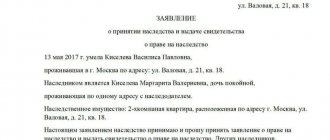Home / Family law / Inheritance
Back
Published: 08/08/2018
Reading time: 9 min
0
952
The procedure for entering into an inheritance after the death of the father can have two main options: if the father left a will for the apartment, or if there is no will. If there is a will, it is given priority, but even when there is no such document, the children have the first right to the father's property after his death.
- Who takes over the inheritance after the death of the father without a will first?
- How to receive an inheritance after the death of your father
- The procedure for accepting and registering an inheritance for an apartment without a will
- Documents for registration of inheritance for an apartment
- Features of inheriting property without a will
- Registration of inheritance through court proceedings
Who can count on inheritance
Inheritance refers to the transfer of a person's assets and property rights to his heirs. The general procedure is regulated by Section V of the third part of the Civil Code of the Russian Federation. In accordance with the provisions of this legislative act, events after the death of the testator develop according to one of two scenarios - depending on whether he left a will or not.
If there is no will
In this situation, inheritance occurs by law, when the rights to the property of a deceased person are determined taking into account the degree of relationship. According to this criterion, the heirs are divided into seven or lines. The first group includes the closest relatives, including:
- children;
- parents;
- spouses.
The second priority includes brothers and sisters, as well as grandparents. The principle of distribution of assets and property rights of the deceased is extremely simple.
The first priority heirs first receive the right to inheritance. Only in case of their absence does it come to the next one. Within one queue, all heirs have equal rights.
To this it is necessary to add three legally important points. The first concerns dependents who are entitled to inheritance and join any of the queues.
The second is related to the so-called inheritance by right of representation. This is a complex situation from a legal point of view when grandchildren and other descendants of the first priority heirs participate in the division of property in the case where the latter died after the death of the testator.
The third legal nuance concerns the common property of the spouses. In this case, the wife or husband of the deceased person receives the right to half of the assets acquired during the marriage in addition to the rights of the first priority heir. In other words, in this situation, not only inheritance law, but also family law, which is regulated by the provisions of the Family Code of the Russian Federation, applies.
If there is a will
A will is a document in which the testator himself establishes a list of heirs and the procedure for distributing property between them. Notarization becomes a mandatory requirement for the document. It is important to note that the number of heirs can include not only relatives, but also any other people, for example, friends or colleagues, and even organizations - both commercial, social or charitable.
The execution of a will does not mean the loss of the rights of the so-called compulsory heirs. These include disabled or minor close relatives (spouse, children, parents), as well as dependents. Their rights are additionally protected by law, which is expressed in the distribution of property first between them and only then in accordance with the text of the will.
Obligatory relatives are entitled to half of what they would have received if they had inherited in order of priority.
Another situation deserves special mention - when not all property is distributed in the will. The remaining assets are inherited by law, that is, in accordance with the order of heirs.
The procedure for accepting and registering an inheritance for an apartment without a will
Quite often, the father’s apartment is inherited. If the head of the family dies without leaving a will, then his property passes to his heirs according to the law. According to Art. 1142-1145 of the Civil Code of the Russian Federation, first of all, real estate is inherited by children, wives and parents.
According to paragraph 2 of Art. 1141 of the Civil Code of the Russian Federation, the heirs of each subsequent stage receive equal shares of what the testator has acquired. An exception is inheritance by right of representation. In the latter case, the share of the deceased heir is divided among his descendants in equal shares.
For example, a citizen had two daughters. One of them died before the death of her father, but she left behind a child. It is the daughter’s child (grandson) who will receive ½ share of the apartment by right of representation, the other half will go to the second daughter.
An apartment can be inherited only if the ownership rights to it have been properly registered. Thus, non-privatized municipal housing is not included in the inheritance estate. But if the father began the privatization procedure during his lifetime, but did not have time to complete it, then the heirs have the right to demand through the court that the right to complete the privatization procedure be transferred to their name.
When the apartment was part of jointly acquired property, it is inherited only to the extent of 50% of the father’s share, while the other 50% remains with the spouse.
When entering into inheritance rights in relation to an apartment, children will have to pay a state fee, which is calculated based on the cost of the apartment. The calculations may be based on the cadastral or market value of the property. The cadastral valuation is contained in an extract from the Unified State Register of Real Estate, which must be obtained from Rosreestr. For a market valuation, you will have to turn to professional appraisers.
The children of the testator pay less state duty for the apartment than persons who are not related to the deceased. The state duty is paid in the amount of 0.3% of the cost of the apartment. The amount received should not exceed 100 thousand rubles. If there are several heirs, then they divide the state duty among themselves in equal amounts.
For example, a daughter and son inherited an apartment from their father with a cadastral value of 5 million rubles. The state duty will be calculated as follows: 5000000*0.3=15000 rub. Each child must pay RUB 7,500. state fees for entering into inheritance rights.
After the notary checks all the submitted documents, he will issue the heirs with a certificate of inheritance. He has the right to register it no earlier than six months after the death of the testator, even if the children applied for the inheritance immediately after the death of their father.
A certificate of inheritance is an official document that serves as the basis for the subsequent re-registration of ownership of a child. To do this, he should contact Rosreestr with the issued certificate and an application to assume ownership rights.
Based on its consideration, the child will receive an extract from the Unified State Register of Real Estate, in which he will be listed as the copyright holder.
Once property rights have been properly legalized, the heir becomes the full owner. Now he can dispose of the apartment at his own discretion: donate it, sell it or bequeath it.
He should also not forget about his responsibilities for timely payment of utilities and property taxes.
Inheritance contract
The will is drawn up by the testator independently. Only he himself will decide whether to inform his heirs about him or not. The information contained in the will is considered secret.
But the legislation also provides for another format of a document similar in meaning, which is called an inheritance agreement. It is concluded between the testator and any of the heirs (or several of them) and contains the conditions for receiving the inheritance.
An inheritance agreement, like a will, is certified by a notary and can be canceled at the request of the testator at any time.
The legislation does not provide for strict requirements for its content. Typically the contract includes the following information:
- rules for determining heirs;
- the procedure for transferring rights to property;
- conditions for appointing an executor;
- responsibilities of heirs, the fulfillment of which is necessary to receive an inheritance (not in conflict with the law);
- other circumstances and conditions affecting the distribution of the testator's assets.
It is important to note that an inheritance agreement has greater legal force than a will. In other words, if both documents are available, the first one is valid.
How not to be left with nothing
Follow the regulations prescribed by law and immediately contact a notary. Consistency and timeliness of actions ensures that your rights are respected. An experienced specialist will help you prepare the documents correctly and take into account all the formalities and nuances. The success of the event directly depends on how complete the package of papers you have and how quickly you collect it. Even if disputes and litigation arise regarding inheritance rights, do not be at a loss, consult with a lawyer. With the right approach, you will get what is due to you.
Who cannot receive an inheritance
The legislation, and specifically Article 1117 of the Civil Code of the Russian Federation, contains the term “unworthy heirs”. It denotes persons who have committed unlawful acts against other heirs or the testator himself. A mandatory additional requirement is confirmation of the fact of the offense in the form of a court decision.
The following persons are recognized as dishonest heirs:
- parents who are officially deprived of parental rights and therefore cannot inherit property after the death of their children;
- heirs who, by force of law, were obliged to support the testator, but avoided doing so;
- heirs who tried to increase their own share of the inheritance or created obstacles in front of other heirs.
The order of two events is important for assigning an heir the status of an unscrupulous one—the adoption of an appropriate decision and the drawing up of a will. Each such situation is considered individually, and only a competent lawyer who specializes in inheritance law can give it a legal assessment.
What can be included in inheritance and what not?
The inheritance is formed from the things and other property of the deceased person, as well as the property rights and obligations belonging to him. In other words, not only assets are subject to inheritance, but also the debts of the testator, which are distributed in a similar way among the heirs.
The exception is those property rights and debts that are directly related to the personality of the deceased person. These include alimony, payments as compensation for harm or damage caused to the health and life of the testator or third parties. Intangible benefits, including non-property rights, are not subject to inclusion in the inheritance.
How to find out about a will
Usually the testator does not hide the fact of drawing up a will, since only the contents of the document are considered secret. The compiler has the right to provide potential heirs with a copy of the orders regarding his own property drawn up at the notary.
The lack of information from the heirs about the execution of the will, and especially its contents, does not lead to a violation of their rights. The fact is that a notary who opens an inheritance case in accordance with established rules is obliged to verify the existence of a will within 24 hours. This is not difficult to do, since any such documents are entered into a federal database maintained by a notary.
If a will is drawn up, the notary carefully examines its contents, after which he notifies all the people mentioned in it. If their contacts are unknown to him, it is permissible to inform interested parties through an announcement in the media.
This does not mean that the potential heir should wait to hear from the notary. The easiest way to obtain the information he is interested in is to contact a notary office, which should handle the inheritance case. The notary is obliged to provide the requested information in the manner prescribed by law.
Features of inheriting property without a will
When inheriting property without a will, it is worth considering some features associated with registering an inheritance for minor children. Thus, according to civil law, they have limited legal capacity until they reach 18 years of age. Therefore, the decision to enter into inheritance must be made for them by their legal representatives.
Minor citizens can be recognized as legally competent after they have reached the age of 16, when they registered their individual entrepreneur, or they got a job or got married.
To enter into an inheritance in relation to the father’s property, an application for this to a notary is submitted by the child’s legal representative (for example, his mother). If the child is already 14 years old at the time of opening the inheritance, then the application is submitted by the teenager himself, but with the consent and in the presence of a legal representative.
If accepting the father's inheritance is unprofitable for the child, he may refuse it. But for this you will need to first obtain permission from the guardianship authorities.
Inheritance is today a common way of transferring property after death. But it is not always convenient and has certain risks and disadvantages.
Thus, when inheriting an apartment without a will, there is a high probability of disputes arising between the heirs . Persons who are left without property may try to challenge the distribution of property.
Also, children will have to wait a long time to receive an inheritance: they will be able to re-register the apartment as their own no earlier than six months after the death of their father . And if there are disputes regarding real estate, then this procedure may drag on even more.
Do not forget that entering into an inheritance is a very expensive procedure and may require children to pay considerable expenses for paying state fees, valuation, etc.
Therefore, during his lifetime, as an alternative to inheritance, the father can transfer the apartment through alienation of property. We are talking about contracts of sale and gift. In order to be sure that the child will get the apartment, you can write a deed of gift for it. This transaction is executed during the life of the father and involves the gratuitous transfer of property rights in favor of the child free of charge.
Its advantage is that property is transferred between relatives by deed of gift without levying tax. Close relatives such as a father and his child do not pay personal income tax, while persons without a relationship who receive property as a gift must pay 13% of the value for it.
When re-registering an apartment using a deed of gift, a child will only need to pay a state fee of 2,000 rubles. for taking ownership, he is exempt from other expenses.
How to inherit
The inheritance case is opened by a notary in accordance with the rules of territorial affiliation, which are established by local authorities. In general, we are talking about the last place of official or temporary registration of the deceased. The main thing that the heir needs to do to enter into the inheritance is to contact the notary who opened the inheritance case before six months have passed after the death of the testator.
Stage No. 1. Contacting a notary
Determining which notary office you need to contact is extremely simple. To do this, just contact the regional notary chamber, the coordinates of which can be found on the official website of the Federal Department.
All that is required from the heir to open a case is to present a passport proving his identity. By law, you don't even need a death certificate, although some notaries are reluctant to request one themselves, which is their responsibility. The result of such a controversial policy from a legal point of view of the notary staff is a refusal to open an inheritance case. Therefore, it is better, simpler and more correct to provide the death certificate of the testator along with the passport.
During a visit to a notary, you must fill out two applications - to open a business and to accept an inheritance. Samples of both documents are provided on site.
The duties of the notary include informing the heir in detail about what additional documents will be required to enter into the inheritance. If the inheritance case was opened by another relative, and there is no information about the notary who did this, you can obtain such information on the official online resource, which is also managed by the Federal Notary Chamber. To search, it is enough to indicate the full name of the deceased, as well as two dates - the day of birth and the day of death.
Another Internet resource deserves special mention, which reflects data on the search for heirs announced by notaries in the framework of open inheritance cases. It is posted on the official website of the FNP at the following address. The search is conducted using the full name of the deceased person who left an inheritance.
It is important to remember that you need to contact a notary before six months have passed from the death of the testator. The consequence of this rule is the impossibility of entering into an inheritance before the end of these six months.
The only exception is receipts within 100 thousand rubles. from the bank account of the testator with mandatory targeted spending on organizing the funeral. Permission to withdraw money is given by a notary, to whom the heir applies with a reasoned statement.
Stage No. 2. Providing the necessary documents
Entering into an inheritance involves collecting and submitting a set of documents to the notary. With some degree of convention, they are divided into two categories. The first includes those that are mandatory in any situation, the second includes those that are required to be filed depending on the type of inherited property.
Mandatory documentation
Two main documents - applications for opening an inheritance case and entering into an inheritance - are mentioned above. They must be accompanied by:
- death certificate of the testator;
- documents confirming relationship with the deceased (one of the birth or marriage certificates) - when entering into inheritance by law;
- an alternative option - a will - when entering into an inheritance under this document;
- a document about the last place of registration of the deceased, for example, an extract from the house register or personal account.
Additional Documentation
Depending on the method of inheritance and the type of inherited property, several most typical situations can be identified. When each of them arises in practice, several additional documents are required:
- House, apartment or other real estate . In this case, it is necessary to prove that the real estate - residential or non-residential - is part of the inheritance. The easiest way to do this is by presenting title documents, for example, a purchase and sale agreement, exchange or donation agreement, DDU, etc.
An alternative option is to provide a certificate of registration of property rights or, as has been issued in recent years, extracts from the Unified State Register of Real Estate. Although usually the notary independently sends a request to the regional division of Rosreestr to confirm ownership rights. In some cases - when registering property rights before the end of January 1998 - it is additionally necessary to obtain from the BTI and submit to the notary a certificate drawn up in Form No. 2.
- Land plot. From a legal point of view, land also refers to real estate. Therefore, in this situation, you will again need to present title documents. The notary carries out a request to Rosreestr to obtain information from the Unified State Register of Real Estate on his own. Although nothing prevents the applicant from providing the extract himself.
- Vehicle. To inherit a car, you must provide the notary with a title, registration certificate, title documents and the results of an independent assessment of the value of the car.
- Inheritance through court. This method of inheritance is practiced in two cases. The first is if the heir did not contact the notary within the established six-month period (an additional condition is a valid reason, for example, illness). The second is inheritance of unregistered property rights. In both cases, you will need to provide to the court:
- statement of claim;
- documentary evidence of payment of the state fee;
- documents confirming the applicant's position.
Stage No. 3. Payment of state duty
Notarial actions for registering an inheritance are paid in the form of a state fee. Its value is determined depending on two factors - the status of the heir and the market value of the inherited assets. The latter is determined on the basis of an independent examination, which is carried out by an accredited specialized organization.
| Heir status | State duty amount | |
| Calculation formula | Maximum value | |
| Spouse Children (including adopted children) Parents Siblings (both paternal and maternal) | 0.3% of the market price of assets | 100 thousand rubles. |
| Other | 0.6% of the market price of assets | 1 million rub. |
The following categories of heirs are exempt from paying state duty:
- incompetent;
- minors and their representatives;
- living in the same apartment or house and registered.
Step #4. Obtaining a certificate of inheritance and registering property
After the expiration of the established period, the notary issues a certificate to the heirs. The received property must be registered accordingly - real estate in Rosreestr, car - in the traffic police.
Documents for registration of inheritance for an apartment
In order to register an inheritance for your father’s apartment, you need to collect a certain set of documents, which includes:
- passport;
- father's death certificate;
- certificate from the passport office , which confirms the father’s last place of residence;
- birth certificate or paternity certificate;
- documents confirming ownership rights to inherited property: certificate of ownership, extract from the Unified State Register or Unified State Register, purchase and sale or privatization agreement;
- a certificate of cadastral value of real estate or an extract from the Unified State Register of Real Estate or a report on the market value of the apartment.
FAQ
What is meant by inheritance?
Inheritance is the property and property rights or obligations of a deceased person that are subject to distribution among the heirs.
What methods of inheritance exist in Russia?
Today, inheritance is carried out in one of two ways: by will (if such a document is officially executed and certified by a notary, an inheritance agreement is equivalent to it) or by law (in all other cases).
Which heirs are in the first line?
Closest relatives – spouses, children, parents.
Who is included in the list of compulsory heirs?
Minor or incapacitated children, disabled or incompetent spouses and parents, and disabled dependents.
How long does it take to contact a notary?
The law establishes the need to contact a notary within six months. If the deadline is missed, it can be restored, but only with the consent of other heirs or by court.
Conclusion
- In Russia, there are two options for inheritance - by will or by law.
- The first option involves the execution and notarization of a will or inheritance agreement. It does not abolish the rights of compulsory heirs.
- The second option is used in all other cases and in relation to property not included in the will. In this case, inheritance occurs in the order of priority established by law.
- The first and main condition for receiving an inheritance is to contact a notary - to open an inheritance case or (if it is already open) to be included in it.
- You must contact a notary within six months. After this, you need to collect and provide the necessary package of documents, obtain the appropriate certificate and register ownership of the property.







